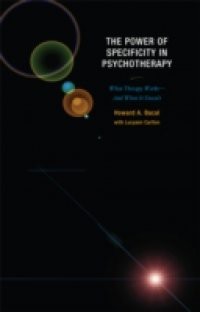In The Power of Specificity in Psychotherapy: When Therapy Works_And When It Doesn't Howard Bacal presents specificity theory, a contemporary process theory of psychotherapy that holds that therapy happens at the fit between the patient's particular therapeutic needs and the therapist's capacity to respond to them, both of which will emerge and change within the unique process of each particular dyad. Specificity theory challenges the traditional method and epistemology of psychoanalysis, wherein the understanding of the patient and the therapeutic response are apprehended through rules and prescriptions that are generated through the application of structure theories. The therapeutic engagement must necessarily and continually be monitored and adjusted to fit the specific and changing needs, capacities, and limitations of both participants, regardless of the therapist's formal working theories. Grounded in the innovative thinking of Sandor Ferenczi and drawing as well from the creative work of Michael Balint, Wilfred Bion, Donald Winnicott, Marion Milner, and Heinz Kohut, the perspectives of specificity theory are corroborated by cutting-edge findings in contemporary neurobiology and infant research. The Power of Specificity in Psychotherapy challenges psychotherapists to reconsider how treatment is optimally practiced.

